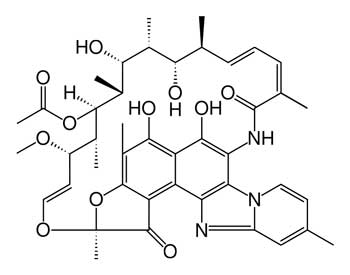Xifaxan (Rifaxamin) is…
an antibiotic drug approved for short term use in traveller’s diarrhea and hepatic encephalopathy. Xafaxan’s inability to pass through the gut walls keeps it sequestered it within the gut and it appears to be able to help rebalance the gut flora by wiping out the anerobic gut flora that flourish in low-oxygen conditions. An in-vitro study indicated Xifaxan inhibited 90% of 536 anerobic bacteria tested.
Currently being studied in irritable bowel syndrome, Traveller’s diarrhea, Crohn’s disease, Parkinson’s disease, cirrhosis of the liver and others, Xafaxin is often used, off-label, to treat small intestine bacterial overgrowth (SIBO).) Rifaximin is approved in 33 countries for GI disorders.
One course of Xafaxan provided long term (up to 10 weeks) relief in people with irritable bowel syndrome (IBS) in a 2010 placebo controlled, double-blinded study (550 mgs 3x’s/day). With patients reporting significant reductions in abdominal pain, bloating and watery stools the study author stated the study would produce “a big change in the way we think about and treat IBS.”
Xafaxan (Rifaximin) May Be Effective in Chronic Fatigue Syndrome or Fibromyalgia Because
It rebalances gut flora and treats small intestine bacterial overgrowth (SIBO) which Dr. Teitelbaum reports is very common in fibromyalgia and chronic fatigue syndrome (ME/CFS). SIBO is usually diagnosed using a hydrogen breath test and is associated with abdominal pain, bloating, belching, constipation or diarrhea.. Dr. De Meirleir reports frequent positive hydrogen sulfide tests indicate anerobic gut conditions commonly occur in ME/CFS. Xafaxan removes the type of bacteria that thrive in those conditions.
Chronic Fatigue Syndrome and Fibromyalgia Patients Report
One patient reported being cured of six years of abdominal distress by one two week course of Xifaxin
From the Gut to the Brain: Esther’s Amazing Chronic Fatigue Syndrome Xifaxin Story
Doctor’s Report
Dr. Teitelbaum reports Xifaxan works very well in FM/CFS patients. Dr. Peterson, De De Meirleir and Dr. Myhill and probably many other ME/CFS practitioners use it to treat small intestine bacteria overgrowth (SIBO).
Alternatives
One study suggested that an herbal approach may be more effective and a safer than using antibiotics.
Cheaper, Safer, Better: the Herbal Approach To Small Intestinal Bacterial Overgrowth
Dose
Dr. Siebecker provides three dose options studies have shown can produce excellent results.
- 1600 mg per day x 10 days- 70-85% success normalizing LBT, 82% success normalizing GBT (Scarpellini)
1650 mg per day x 14 days (Pimentel), 550 mg tid. - 1200 mg per day x 14 days- 87-91% success normalizing GBT, 90-94% symptom improvement (Lombardo
- 1200 mg per day x 10 days with 5 g per day Partially Hydrolyzed Guar Gum
-87% success normalizing GBT, 91% symptom improvement (Furnari)
See Dr. Siebecker’s website for dosing information when neomycin or metronidazole is added
Xafaxan is not recommended for long-term use because of the possibility of bacterial resistance developing.
Cost
Xafaxan (Rifaximin) is a short term but still expensive drug, not always covered by insurance. One patient with extreme gut issues reported spending over $800 on a two week trial. (The drug worked.) With Salix, the drug’s manufacturer getting FDA approval for hepatic encephalopathy recently, the drug is not expected to go generic for many years. The drug may be available in Canadian pharmacies but Canada has not approved the drug for sale.







